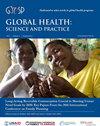Capacity-Building Through Digital Approaches: Evaluating the Feasibility and Effectiveness of eLearning to Introduce Subcutaneous DMPA Self-Injection in Senegal and Uganda.
IF 2.5
3区 医学
Q2 PUBLIC, ENVIRONMENTAL & OCCUPATIONAL HEALTH
引用次数: 0
Abstract
Training health workers is one of the biggest challenges and cost drivers when introducing a new contraceptive method or service delivery innovation. PATH developed a digital training curriculum for family planning providers who are learning to offer subcutaneous DMPA (DMPA-SC), including through self-injection, as an option among a range of contraceptive methods. The DMPA-SC eLearning course for health workers includes 10 lessons with an emphasis on informed choice counseling and training clients to self-inject. In partnership with Ministries of Health in Senegal and Uganda, the course was rolled out in select areas in 2019-2020, including during the COVID-19 pandemic when physical distancing requirements restricted in-person training. We conducted evaluations in both countries to assess the practical application of this digital training approach for contraceptive introduction. The evaluation consisted of a post-training survey, an observational assessment conducted during post-training supportive supervision, and an estimation of training costs.In both countries, a majority (88.6% in Uganda and 64.3% in Senegal) scored above 80% on a DMPA-SC knowledge test following the training. In Senegal, where there was a comparison group of providers trained in person, those providers scored similar on the post-test to eLearners. Providers in both groups and in both countries felt more prepared to administer DMPA-SC or offer self-injection to clients after receiving a supervision visit (93%-98% of eLearners felt very prepared after supervision as compared to 45%-72% prior). The evaluation results suggest that digital approaches offer a number of benefits, can be cost-effective, and are most optimal when blended with in-person training and/or supportive supervision.通过数字化方法进行能力建设:评估电子学习在塞内加尔和乌干达引入皮下 DMPA 自我注射的可行性和有效性。
在引入新的避孕方法或服务创新时,培训卫生工作者是最大的挑战和成本驱动因素之一。适宜卫生技术组织为正在学习提供皮下注射 DMPA(DMPA-SC)(包括通过自我注射)作为一系列避孕方法中的一种选择的计划生育服务提供者开发了一个数字培训课程。针对卫生工作者的 DMPA-SC 电子学习课程包括 10 节课,重点是知情选择咨询和培训客户进行自我注射。我们与塞内加尔和乌干达卫生部合作,于 2019-2020 年在选定地区推出了这一课程,包括在 COVID-19 大流行期间,当时由于物理距离要求限制了现场培训。我们在这两个国家进行了评估,以评估这种数字培训方法在避孕药具介绍方面的实际应用。评估包括培训后调查、培训后支持性督导期间进行的观察评估以及培训成本估算。在这两个国家,大多数人(乌干达为 88.6%,塞内加尔为 64.3%)在培训后的 DMPA-SC 知识测试中得分超过 80%。在塞内加尔,有一个由接受过面授培训的医疗服务提供者组成的对比组,这些医疗服务提供者在培训后测试中的得分与电子学习者相近。在接受督导访问后,两组和两个国家的医疗服务提供者都认为自己为给客户注射 DMPA-SC 或提供自我注射做好了更充分的准备(93%-98% 的电子学习者在接受督导后认为自己准备得非常充分,而在接受督导前只有 45%-72% 的电子学习者认为自己准备得非常充分)。评估结果表明,数字化方法有很多好处,成本效益高,而且与现场培训和/或支持性督导相结合时效果最佳。
本文章由计算机程序翻译,如有差异,请以英文原文为准。
求助全文
约1分钟内获得全文
求助全文
来源期刊

Global Health: Science and Practice
Medicine-Health Policy
CiteScore
3.50
自引率
7.50%
发文量
178
审稿时长
22 weeks
期刊介绍:
Global Health: Science and Practice (GHSP) is a no-fee, open-access, peer-reviewed, online journal aimed to improve health practice, especially in low- and middle-income countries. Our goal is to reach those who design, implement, manage, evaluate, and otherwise support health programs. We are especially interested in advancing knowledge on practical program implementation issues, with information on what programs entail and how they are implemented. GHSP is currently indexed in PubMed, PubMed Central, POPLINE, EBSCO, SCOPUS,. the Web of Science Emerging Sources Citation Index, and the USAID Development Experience Clearinghouse (DEC).
TOPICS:
Issued four times a year, GHSP will include articles on all global health topics, covering diverse programming models and a wide range of cross-cutting issues that impact and support health systems. Examples include but are not limited to:
Health:
Addiction and harm reduction,
Child Health,
Communicable and Emerging Diseases,
Disaster Preparedness and Response,
Environmental Health,
Family Planning/Reproductive Health,
HIV/AIDS,
Malaria,
Maternal Health,
Neglected Tropical Diseases,
Non-Communicable Diseases/Injuries,
Nutrition,
Tuberculosis,
Water and Sanitation.
Cross-Cutting Issues:
Epidemiology,
Gender,
Health Communication/Healthy Behavior,
Health Policy and Advocacy,
Health Systems,
Human Resources/Training,
Knowledge Management,
Logistics and Supply Chain Management,
Management and Governance,
mHealth/eHealth/digital health,
Monitoring and Evaluation,
Scale Up,
Youth.
 求助内容:
求助内容: 应助结果提醒方式:
应助结果提醒方式:


